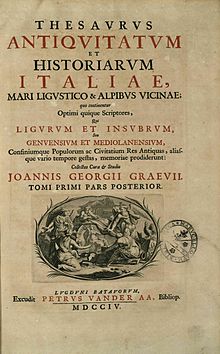143:
20:
353:
205:(1704–1725), although these have not always been looked upon favourably. His editions of the classics, although they marked a distinct advance in scholarship, are now for the most part superseded. They include
197:
336:
in: Brosens, Koenraad; Kelchtermans, Leen; Van der
Stighelen , Katlijne (Ed.), Family ties: Art production and kinship patterns in the early modern Low Countries, Turnhout 2012, pp. 131-14
268:
who was a prominent classical scholar and numismatist. He posthumously edited a collection of Albert Rubens's essays on ancient clothing, coins and gems, which was published in 1665 by
153:
Graevius enjoyed a very high reputation as a teacher, and his lecture-room was crowded by pupils, many of them of distinguished rank, from all parts of the world. He was visited by
368:
440:
373:
127:. Two years afterwards, on the recommendation of Gronovius, he was chosen to succeed that scholar at Deventer; in 1662 he moved to the
445:
425:
260:
He also edited many of the writings of contemporary scholars. He corresponded with scholars throughout Europe including with
142:
450:
430:
173:
435:
233:
67:
19:
131:, where he occupied first the chair of rhetoric, and in addition, from 1667 until his death, that of
202:
162:
124:
38:; Latin: Joannes/Johannes Georgius Graevius; 29 January 1632 – 11 January 1703) was a German
420:
415:
83:
51:
8:
158:
176:(reigned 1690–1716); part of it was later transferred to Heidelberg University Library
128:
395:
269:
265:
223:
154:
136:
39:
326:
47:
166:
108:
79:
172:
His library, rich in antiquarian classical books, was bought after his death by
112:
409:
364:
359:
261:
93:
385:
by
Burmann (1703) contains an exhaustive list of the works of this scholar.
103:
During his residence in
Amsterdam, under Blondel's influence he abandoned
116:
104:
377:. Vol. 12 (11th ed.). Cambridge University Press. p. 315.
249:
87:
97:
75:
245:
239:
120:
90:
71:
358:
This article incorporates text from a publication now in the
180:
132:
317:, Paris 1842–1844, who calls this last work "poorly researched".
254:
213:
207:
43:
274:
De re vestiaria veterum, , et alia eiusdem opuscula posthuma
63:
74:, under whose influence he abandoned jurisprudence for
297:
295:
293:
291:
289:
201:
published after his death, and continued by the elder
286:
407:
315:Manuel du libraire et de l’amateur des livres
198:Thesaurus antiquitatum et historiarum Italiae
147:Thesaurus antiquitatum et historiarum Italiae
157:and honoured with special recognition by
62:Graevius was originally intended for the
363:
301:
141:
18:
408:
191:His two most important works are the
441:Academic staff of Utrecht University
253:(1680), and several of the works of
195:(1694–1699, in 12 volumes), and the
161:, and was a particular favourite of
313:Not, for example, in J.-C. Brunet,
111:; and in 1656 he was called by the
13:
320:
14:
462:
78:. He completed his studies under
400:History of Classical Scholarship
388:P.H. Kulb in Ersch and Gruber's
351:
193:Thesaurus antiquitatum Romanarum
174:Johann Wilhelm, Elector Palatine
66:, but made the acquaintance of
446:17th-century German historians
307:
1:
279:
86:, and among others under the
426:People from Naumburg (Saale)
7:
451:Political science educators
272:in Antwerp under the title
16:German academic (1632–1703)
10:
467:
344:
68:Johann Friedrich Gronovius
431:German classical scholars
402:, part ii, Cambridge 1908
70:during a casual visit to
390:Allgemeine Encyklopädie
374:Encyclopædia Britannica
186:
57:
369:Graevius, Johann Georg
163:William III of England
150:
125:University of Duisburg
24:
23:Johann Georg Graevius.
229:Historiae Philippicae
145:
129:University of Utrecht
28:Johann Georg Graevius
22:
52:Electorate of Saxony
436:German philologists
151:
25:
270:Balthasar Moretus
266:Peter Paul Rubens
179:Graevius died in
155:Lorenzo Magalotti
46:. He was born in
40:classical scholar
458:
378:
357:
355:
354:
338:
329:, Nils Büttner,
324:
318:
311:
305:
299:
119:to the chair of
466:
465:
461:
460:
459:
457:
456:
455:
406:
405:
383:Oratio funebris
367:, ed. (1911). "
352:
350:
347:
342:
341:
325:
321:
312:
308:
300:
287:
282:
189:
167:historiographer
165:, who made him
109:Reformed Church
107:and joined the
80:Daniel Heinsius
60:
17:
12:
11:
5:
464:
454:
453:
448:
443:
438:
433:
428:
423:
418:
404:
403:
393:
392:, Leipzig 1818
386:
379:
365:Chisholm, Hugh
346:
343:
340:
339:
331:Rubens&son
327:Rubens&son
319:
306:
284:
283:
281:
278:
219:Pseudosophista
203:Pieter Burmann
188:
185:
59:
56:
15:
9:
6:
4:
3:
2:
463:
452:
449:
447:
444:
442:
439:
437:
434:
432:
429:
427:
424:
422:
419:
417:
414:
413:
411:
401:
397:
394:
391:
387:
384:
380:
376:
375:
370:
366:
361:
360:public domain
349:
348:
337:
334:
333:
330:
323:
316:
310:
303:
302:Chisholm 1911
298:
296:
294:
292:
290:
285:
277:
275:
271:
267:
264:, the son of
263:
262:Albert Rubens
258:
256:
252:
251:
247:
242:
241:
236:
235:
230:
226:
225:
220:
216:
215:
210:
209:
204:
200:
199:
194:
184:
182:
177:
175:
170:
168:
164:
160:
156:
148:
144:
140:
138:
134:
130:
126:
122:
118:
114:
110:
106:
101:
99:
95:
94:David Blondel
92:
89:
85:
81:
77:
73:
69:
65:
55:
53:
49:
45:
41:
37:
33:
29:
21:
399:
389:
382:
372:
335:
332:
328:
322:
314:
309:
273:
259:
244:
238:
232:
228:
222:
218:
212:
206:
196:
192:
190:
178:
171:
152:
146:
102:
61:
35:
31:
30:(originally
27:
26:
421:1703 deaths
416:1632 births
396:J.E. Sandys
117:Brandenburg
105:Lutheranism
410:Categories
280:References
250:Propertius
91:theologian
88:Protestant
234:Suetonius
183:in 1703.
159:Louis XIV
98:Amsterdam
76:philology
50:, in the
246:Tibullus
240:Catullus
237:(1672),
231:(1669),
221:(1668),
211:(1667),
137:politics
121:rhetoric
72:Deventer
48:Naumburg
362::
345:Sources
181:Utrecht
169:royal.
133:history
123:in the
113:Elector
356:
255:Cicero
224:Justin
214:Lucian
208:Hesiod
149:, 1704
84:Leiden
44:critic
36:Greffe
32:Grava
381:The
187:Work
135:and
58:Life
42:and
371:".
248:et
115:of
96:at
82:at
64:law
34:or
412::
398:,
288:^
276:.
257:.
243:,
227:,
217:,
139:.
100:.
54:.
304:.
Text is available under the Creative Commons Attribution-ShareAlike License. Additional terms may apply.

